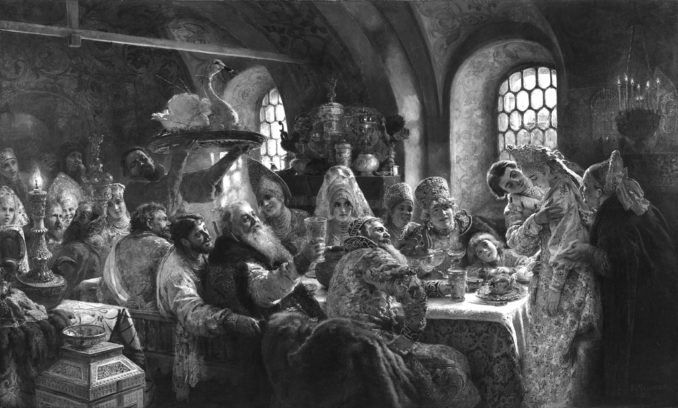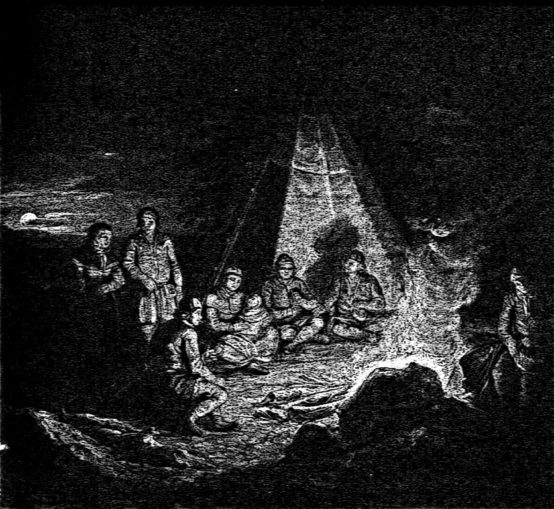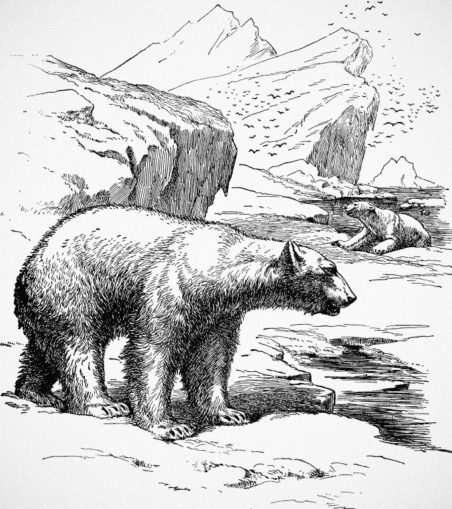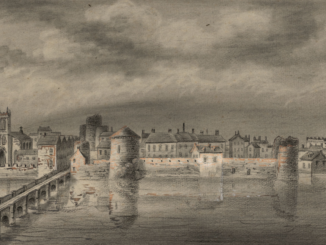December 22nd, 1809 (December 10th O.S.).
Count Bagarov has taken Fred’s advice about using a bomb ship to penetrate the North-East Passage, and has sent one of his agents to St Petersburg to try to find such a vessel. This will be a long task, beginning with a slow overland journey, unprotected by bears, to the capital. Then a suitable ship has to be found in some Baltic port, and it must be paid for and manned, and lastly sailed round the coast of Norway and into the White Sea in the middle of an Arctic winter. At least, if and when the ship arrives, we shall know whether she is suitable for our venture.

The Count’s enthusiasm for this expedition seems to be infinite, as indeed do his resources. We feel ourselves most fortunate to be taken up in this noble endeavour.
Christmas Day, 1809 (December 13th O.S.).
We are celebrating Christmas twice, first on our own day in the Gregorian calendar, then twelve days later in the Old Style Julian calendar – and why not? Our generous host is content with this arrangement, and his chaplain, Father Grigory, willingly arranged a service for us this morning, which was attended by all his household. It was conducted according to the customary and beautiful Orthodox rite, but the chaplain asked Fred to make a short address to the congregation to explain the reason for the service.
Fred in turn asked me to write it, and this is what I wrote.
My friends, we your English guests are celebrating Christmas twelve days before you simply because it is our custom, following human astronomers who have adjusted the calendar to correct the observations of other human astronomers. The date may be important to human and bears, but what is it in the mighty workings of Heaven? Indeed, it is one of the miracles of our religion that Christ was born not to a noble family who would have recorded the date, but to a humble carpenter’s wife on an unknown day in an unknown year. He crept secretly into the world to save us not with a famous name that would have attracted many followers, but through private faith. In twelve days’ time we shall be joining you to celebrate the birth of Christ once more, with all our hearts.
With the Count’s help I translated this into Russian, and after Fred has delivered his address the Count repeated it in this language for the benefit of the congregation, who were visibly moved by its sentiments. There has long been a concord between the Anglican and Orthodox churches, based on the fact that we both have our differences with the Catholics.
In the evening we had a meal which was the nearest we could contrive to an English Christmas dinner. There were no roasted geese, but we had plenty of ptarmigans which in my view make better eating, and Dolores and the Count’s cook had conspired to produce a very creditable Christmas pudding. The cook was astonished to discover that one can make a compact confection by boiling it in a buttered and floured cloth, and now has ideas of his own for Russian puddings. Perhaps this invention, which dates only from the sixteenth century, is England’s greatest contribution to cookery.
We finished the evening with music and dancing, and Fred, Jem and Dolores sang English Christmas carols as well as they could, which were kindly received. But to tell the truth, I think that the Count’s household think that we are quaint barbarians with outlandish customs. They are accommodating us generously, and we hope to repay them with all the help we can offer.
January 6th, 1810 (Christmas Day, 1809 O.S.)
Our feeble celebrations are looking very thin compared to the Orthodox Christmas. Festivities begin on Christmas Eve, with services in the chapel – long but never tiresome, with wonderful singing. Then there is a huge meal with twelve courses to represent the twelve Apostles, at which all kinds of strange foods appear, the principal one being kutia, a kind of wheat porridge with fruit, honey and poppy seeds which is probably not unlike the old English ‘Christmas pottage’ from the time before the English invention of the pudding cloth.
A long vigil in the chapel follows until midnight, when the proper celebration of the birth of Christ begins, with more services on Christmas Day followed by more feasting. Even a bear feels dazed by the alternation of divine services with copious food and drink. Both little Henry and Dolores had to be carried to their respective beds at the end of the proceedings, and I confess that I was a little unsteady myself.
January 7th, 1810 (26th December, 1809 O.S.)
Jem has proposed to Dolores, and the two are to be married as soon as possible. Perhaps there is a certain urgency about this, as a bear’s acute nose has been able to detect for some time that she is with child. Human decorum dictates that the niceties have to be observed, but it is much simpler for bears: you choose a mate with care but without celebration or contract, and you are together for life.
So far in this journal I have not mentioned my mate Silvio, the father of my dear cub Bruin, cruelly taken from me by a hunter’s bullet when we were touring in the Tyrol. Bruin and I and Fred will always feel the lack of his huge genial presence, and I shall never forget the joy of dancing with him in front of a cheering crowd to the thin music of Fred’s fiddle. The Italian idea of ‘hunting’ is to kill everything in sight from sparrows upwards, a view all too common in the Mediterranean countries. I really only feel safe in England – or at least I did until recently, where the law has become a hunter crueller than any Italian with an ancient musket, driving us away to far Russia.
Father Grigory has kindly allowed the couple to be married there according to the Orthodox rite, which would not usually be permitted to foreigners but this is considered family business. It is a protracted proceeding, beginning with a celebration of betrothal in the entrance of the chapel, during which the couple held lighted candles. They also exchanged rings, something which in England is done at the wedding ceremony. All the liturgy is conducted in the Church Slavonic language, holy but incomprehensible even, I think, largely to the good priest himself. The bears looked on fondly, enjoying the sentiment for which it was worth enduring the lengthy ancient rigmarole.
February 11th, 1810 (January 31st O.S.)
This was the first day of the wedding celebration, which will continue for a week of feasting. It is a complicated business in this country, that is sure. It begins with a joke. The bridegroom arrives at the house of his bride – or in this case her room on the Count’s house – in order to claim her by paying a ‘bride price’, a tradition which is mentioned by Homer, though he also speaks of a bride’s family paying the more familiar dowry – the Iliad and Odyssey, assembled over some years, describe the traditions of several nations at different times.
The bride price is money or an article of jewellery; in Jem’s case it was some gold sovereigns from the remnant of our meagre savings brought from England. The response was to bring out a veiled ‘bride’ who, when Jem lifted the veil, turned out to be Fred saying, ‘Cheerio, me old mucker, yer’ll ’ave to pay more to get the real gal.’
Jem accordingly threw in a few more sovereigns – not that it matters, as we are simply paying each other with money we hold in common – and a veiled Dolores was led out for examination and approval. The bears watched this bizarre exchange incredulously – we will never understand how humans manage to involve themselves in such machinations.
The couple then proceeded to the chapel, where the priest led them on to a square of carpet which looked light brown to a bear’s eyes, but later Fred told me that it was rose-coloured to symbolise a rosy future. Here both Dolores and Jem were required to state publicly in Russian that they were marrying of their own free will, which they did prettily enough. After a good deal of Slavonic muttering, the priest put golden crowns – real enough and borrowed from the Count – on both their heads.
There followed an extraordinary procession in which the priest wrapped his stole around the joined hands of the couple and they all walked three times around the analogion, a lectern on which a copy of the Gospels was placed. Then there were more blessings, and the long proceedings finally closed.
This was followed by a lavish feast – the good Count does not stint his guests. We ate and drank and danced, and the humans sang. More than the gift of speech, which I can supply by writing on my slate, I envy humans their ability to sing melodiously rather than roaring tunelessly as we are constrained to do. And there are few nations that sing better than the Russians. The couple will wear their crowns until the festivities finish, with some difficulty as they have to be held on with one hand while dancing.

February 19th, 1810 (February 7th O.S.)
The long feast is finally over. I thought I would never get tired of eating and drinking, but I own that I am bloated and jaded with the effects of consuming gallons of vodka, a clean enough spirit when well made but every draught has its Nemesis. All the bears are looking worse for wear, and the humans are pale and dazed. But the important thing is that Jem and Dolores are now mates in the eyes of God, men and bears, and their headaches cannot mask their happiness.
March 1st, 1810 (February 16th O.S.)
I have not recently mentioned the recovery of Nikita, the polar bear who is the newest recruit to our band. His spirits have been completely restored by good company and merriment, and indeed his wild hilarity is sometimes excessive, but polar bears are creatures of light and dark and not of the many shades of grey between. He joins in our dances with more enthusiasm than skill and, though we are all glad to have him with us, it is clear that he will never be a performer.
Sadly, he cannot remain with us for ever. Accustomed to the northern ice, he would be most uncomfortable in more southerly latitudes. Therefore Count Bagarov, always admirably solicitous of his people’s needs, has been seeking a female polar bear to complete his life when we are gone. And, to our amazement, his agents seem to have found one.
In the oblast or province of Murmansk, separated from us by a few miles of sea, lives Turi, an ancient seer of the Sami people, whom the Swedes call Lapps. All his life he has dwelt in harmony with polar bears, which are sacred to the Sami, his latest companion being a she-bear no more than three years old, rescued as a cub after her parents were shot by Russian hunters.. He is now near the end of his days, but his bear will live on. Can we persuade her to cross the water to Archangel and a very different life in the company of an eccentric Russian noble, with a male bear that she has never seen before?
At least we can try to find out. As Ovid says, Audentem Forsque Venusque iuvant, Fortune and Love favour the bold. We shall make an expedition to the dying holy man and try to gain both his blessing and his bear.
March 15th, 1810 (March 3rd O.S.)
While travel in far northern latitudes in the cold seasons is never easy, it is much eased by the power of a wealthy nobleman. The Count had rightly judged that for Nikita to woo his potential mate, the whole tribe of bears must be called into action, and it was a large party equipped with sleighs and horses and well stocked with provisions that took ship from Archangel.
The farther shore is sparsely inhabited. We landed at the small village of Tetrino, a few wooden houses around an onion-domed wooden church, where the Count has recruited a local man, Misha, to guide us to the Sami settlement.
March 20th, 1810 (March 8th O.S.)
Oue company of bears numbers ten once more! It was a short journey to the Sami settlement. I was surprised to see conical tents like the teepees made by the natives of North America, but perhaps this is the easiest form of tent to make if you have a supply of straight branches to support it.

Here we were introduced to Turi, the noaidi or holy man of the local people, whose role is to mediate between the many deities of their polytheistic religion and the people. He was indeed very old and it was clear that his life was ebbing, but when he saw bears and humans in harmony, his wrinkled face brightened. He explained through Misha that the bear was wandering not far way, and that he would call her with his spiritual powers. She is called Beaivi, after the Sami sun goddess who is the mother of mankind. Sure enough she came, and Nikita watched her eagerly as she approached.

We stood around as they sniffed each other, and it was clear that there was an instant bond between them – two bears brought up by men, far from their own kind. We knew that they were now mates, but Turi confirmed it for the humans by singing a long sacred song. The language was incomprehensible, but each line ended with a kind of refrain, voia voia or nana nana, and sometimes both. In its complexity it reminded me of the Orthodox wedding liturgy. Anyway, Nikita and Beaivi are now married in the sight of Ipmil – the Samis’ god who created the world – and bears and men. As for the couple, I have never seen happier bears.
We said our farewells to Turi – and may Ipmil look mercifully on him when he passes – and the Count left a present of money for the village. Then we returned to the ship, and I write this as we are sailing back to Archangel.
Copyright © Tachybaptus 2019
The Goodnight Vienna Audio file
Audio Player



